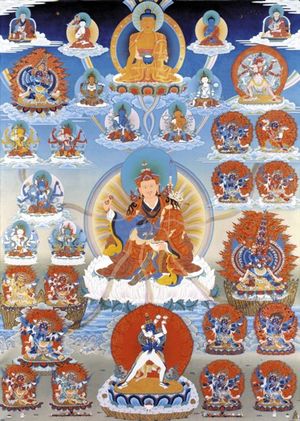The Profound Instruction of Tendrel Nyesel: Difference between revisions
No edit summary |
(Tibetan.) |
||
| (One intermediate revision by one other user not shown) | |||
| Line 1: | Line 1: | ||
''' | [[Image:Tendrel Nyesel.jpg|thumb|[[Thangka]] commissioned by [[Sogyal Rinpoche]] under the guidance of [[Kyabjé Trulshik Rinpoche]]. Painted by Salga.]] | ||
'''The Profound Instruction of [[Tendrel Nyesel]]''' (TIb. རྟེན་འབྲེལ་ཉེས་སེལ་གྱི་གདམས་པ་ཟབ་མོ་, [[Wyl.]] ''rten ‘brel nyes sel gyi gdams pa zab mo'') is the long, elaborate [[sadhana]] revealed as [[terma]] by [[Tertön Sogyal]] in the year 1900. The original terma revelation consisted only of this long practice. Two other practices—a medium length one, ‘[[The Medium Length Practice of Tendrel Nyesel]]’; and a brief one, ‘[[The Brief Practice of Tendrel Nyesel]]’—were revealed later. | |||
It begins with the record of a conversation between [[Guru Rinpoche]] and his main disciple and spiritual consort, [[Yeshe Tsogyal]], which explains the meaning of ‘[[tendrel]]’ and introduces four methods for removing flaws in [[interdependence]]. | It begins with the record of a conversation between [[Guru Rinpoche]] and his main disciple and spiritual consort, [[Yeshe Tsogyal]], which explains the meaning of ‘[[tendrel]]’ and introduces four methods for removing flaws in [[interdependence]]. | ||
Latest revision as of 00:32, 8 August 2018

The Profound Instruction of Tendrel Nyesel (TIb. རྟེན་འབྲེལ་ཉེས་སེལ་གྱི་གདམས་པ་ཟབ་མོ་, Wyl. rten ‘brel nyes sel gyi gdams pa zab mo) is the long, elaborate sadhana revealed as terma by Tertön Sogyal in the year 1900. The original terma revelation consisted only of this long practice. Two other practices—a medium length one, ‘The Medium Length Practice of Tendrel Nyesel’; and a brief one, ‘The Brief Practice of Tendrel Nyesel’—were revealed later.
It begins with the record of a conversation between Guru Rinpoche and his main disciple and spiritual consort, Yeshe Tsogyal, which explains the meaning of ‘tendrel’ and introduces four methods for removing flaws in interdependence.
It also contains a Dzogchen Instruction called ‘Employing the Crucial Point’.